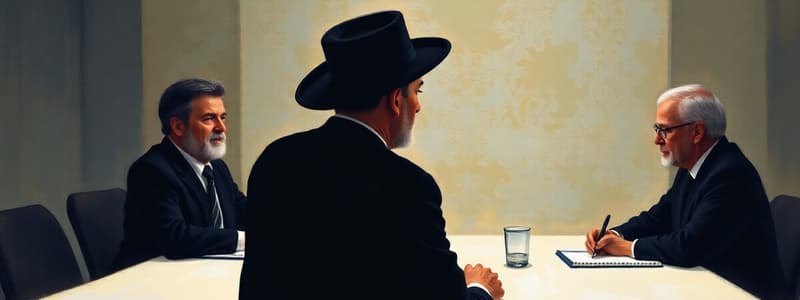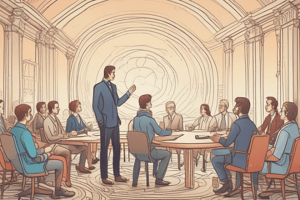Podcast
Questions and Answers
What are the three main focuses a meeting can have?
What are the three main focuses a meeting can have?
Meetings can focus on exchanging information, reaching decisions, or collaborating to solve problems.
What is the importance of selecting the right participants for a meeting?
What is the importance of selecting the right participants for a meeting?
Selecting the right participants ensures that only those who can contribute effectively to the meeting's objective are involved.
How can the choice of venue and time affect the effectiveness of a meeting?
How can the choice of venue and time affect the effectiveness of a meeting?
The venue and time can influence participation, engagement, and overall convenience for attendees, which are crucial for a productive meeting.
What role does setting an agenda play in the success of a meeting?
What role does setting an agenda play in the success of a meeting?
Why is it necessary to keep discussions on track during a meeting?
Why is it necessary to keep discussions on track during a meeting?
How can encouraging participation affect the outcome of a meeting?
How can encouraging participation affect the outcome of a meeting?
What are three key actions that should be taken after a meeting?
What are three key actions that should be taken after a meeting?
What follow-up actions are suggested after a meeting to ensure productive use of results?
What follow-up actions are suggested after a meeting to ensure productive use of results?
What formal process might be needed for larger meetings to maintain order?
What formal process might be needed for larger meetings to maintain order?
Why is it important to have a written or recorded record of a meeting?
Why is it important to have a written or recorded record of a meeting?
Name two technologies that companies use to enhance virtual meetings.
Name two technologies that companies use to enhance virtual meetings.
What factors should be considered when preparing for a meeting?
What factors should be considered when preparing for a meeting?
How can virtual meetings benefit companies?
How can virtual meetings benefit companies?
What role does effective leadership play in a meeting?
What role does effective leadership play in a meeting?
Describe the role of telepresence in meetings.
Describe the role of telepresence in meetings.
What steps should be taken to ensure that meeting results are effectively used?
What steps should be taken to ensure that meeting results are effectively used?
Flashcards
Meeting purpose
Meeting purpose
A meeting where participants come together to discuss a specific topic, make decisions, or brainstorm solutions.
Meeting participants
Meeting participants
The people invited to a meeting should be directly involved in achieving the meeting's purpose.
Venue and Time
Venue and Time
The location and time of a meeting should be convenient for all participants, considering accessibility, time zones, and the type of meeting.
Meeting Agenda
Meeting Agenda
Signup and view all the flashcards
Keeping the discussion on track
Keeping the discussion on track
Signup and view all the flashcards
Following meeting rules
Following meeting rules
Signup and view all the flashcards
Encouraging Participation
Encouraging Participation
Signup and view all the flashcards
Active Participation
Active Participation
Signup and view all the flashcards
Meeting Minutes
Meeting Minutes
Signup and view all the flashcards
Virtual Meeting
Virtual Meeting
Signup and view all the flashcards
Videoconferencing
Videoconferencing
Signup and view all the flashcards
Telepresence
Telepresence
Signup and view all the flashcards
Instant Messaging (IM)
Instant Messaging (IM)
Signup and view all the flashcards
Teleconferencing
Teleconferencing
Signup and view all the flashcards
Distributing Meeting Results
Distributing Meeting Results
Signup and view all the flashcards
Study Notes
Effective Meeting Introduction
- Shared responsibility for productive meetings exists for all attendees
- Leaders have an added degree of responsibility and accountability
Making Meetings More Productive
- Workplace communication frequently occurs during meetings (in-person or online)
- Meeting skills are crucial for effective contributions and recognition
- Well-structured meetings facilitate problem-solving, idea development, and identifying opportunities
- Meetings foster team building through social interaction
Four Planning Tasks in Meetings
- Define your purpose: Meetings can focus on information exchange, decisions, or problem-solving/opportunity identification
- Select participants: Invite only those truly needed; exclude unnecessary attendees. Focus on individuals directly contributing to the objective
- Choose the venue and time: Online meetings connect dispersed groups; in-person meetings necessitate facility and seating review
- Set the agenda: Meeting success relies on participants' preparation. The agenda should clearly list topics and expected discussion order, establishing time limits for each topic.
Effective Meeting Practices
- Keep the discussion on track: Maintain focus on assigned topics during meetings. Successful meetings yield best ideas and information from group members
- Follow agreed-upon rules: Meetings, especially larger ones, require formal procedures such as parliamentary procedure for order.
- Encourage participation: Ensure all can contribute, recognizing that some attendees may be quiet or talkative.
Typical Meeting Agenda Example
- Merger concerns (20 min): Discusses transition costs (severance packages, infrastructure investments, service contracts)
- Information systems (10 min): Focuses on migration to cloud computing and communication platform selection
- Marketing and sales (45 min): Includes brand integration, sales force realignment, and quota/commission questions
Putting Meeting Results to Productive Use
- Meeting value extends beyond the meeting itself. Follow-up actions are necessary
- Address problems/opportunities arising during meetings
- Distribute action items and key decisions to all affected parties, even attendees unable to attend
- Meeting records (written, audio, video) allow participants to review and confirm conclusions
Meeting Technologies
-
Depending on available technology, use tools to record, distribute, and store meeting minutes
-
Virtual meetings reduce costs, resource usage, and employee workload
-
Instant messaging (IM) and teleconferencing: Simple forms of virtual meetings
-
Videoconferencing: Participants see and hear each other; good for product demonstrations.
-
Telepresence: Enables realistic conferences for geographically dispersed participants
-
Virtual whiteboards: Support real-time collaboration amidst a wide range of events such as press conferences, sales presentations, training sessions, etc.
Studying That Suits You
Use AI to generate personalized quizzes and flashcards to suit your learning preferences.




